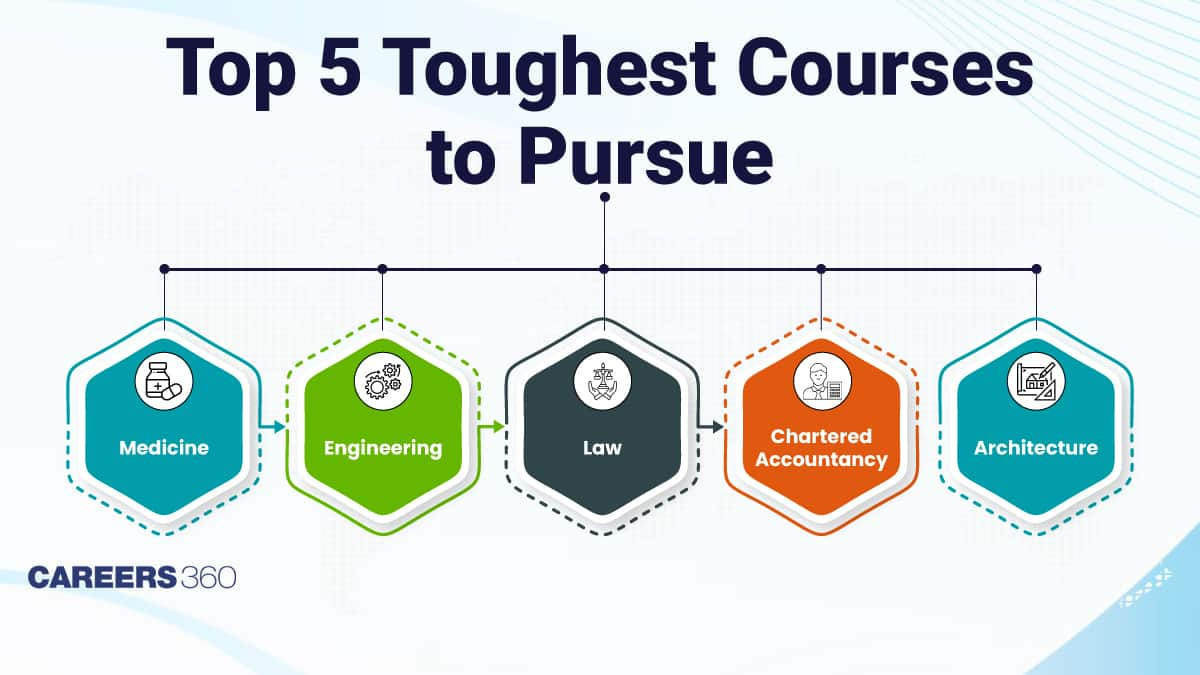Top 5 Toughest Courses to Pursue in 2025
A good education can open doors to endless opportunities, but some academic paths are known for their complexity and challenging curriculum. In this article, we will explore the five toughest courses to pursue, based on their rigorous curriculum, competitive admissions, and level of skillset and experience required. It is advisable to check the course requirements and admission requirements before applying for admission.

Medicine
Medicine is a challenging discipline that requires dedication and effort. It is one of the most demanding disciplines globally. Students have to invest five to six years in studying different medical areas such as the human body, diseases, and treatments, starting with medical coaching, medical school, internships, and postings. Some of the challenges a student may face are listed below.
Volume of Study Material: The syllabus of Medicine is known for being extensive. Students have to study various areas of medicine in detail such as anatomy, pharmacology, and others.
Practical Experience: Medical students have to spend long hours in labs and hospitals which can be physically and mentally exhausting.
Continuous Learning: Even after becoming a doctor, they have to adapt and stay updated with the current trends.
Engineering
Engineering is very important for the modern world, but it combines creativity and technical expertise from its students. Engineering courses, particularly in fields like aerospace, mechanical, and electrical engineering, are known for their technical rigour. They blend theoretical knowledge with practical applications. Some of the challenges faced by the students are mentioned below.
Advanced Mathematics: The engineering curriculum involves advanced mathematics which can be very challenging for some students. Mathematics is also applied in Physics, which forms a majority of the engineering syllabus.
Project Work: Engineering demands hands-on projects that require innovative thinking and precision.
Intense Competition: Admission to top engineering colleges is often very competitive with millions of students appearing for the entrance exams.
Law
Law forms the backbone of society and, therefore, requires a lot of hard work and dedication. Students are required to study various legal systems, case studies, statutes, along with analytical and critical thinking skills. Some of the challenges faced by the law students include.
Volume of Reading: Law students need to study and analyse extensive texts, cases, and judgements which can be very exhaustive in the long run.
Critical Thinking: Law students need to analyse legal problems and crafting arguments. It requires sharp reasoning skills and the ability to analyse a lot of texts.
High Stakes: A small mistake by the lawyer, can have serious real-world consequences.
Chartered Accountancy (CA)
Chartered Accountancy popularly known as CA is a field that requires students to have good financial knowledge, precision, and perseverance. CA can be very challenging and has a high level of difficulty with a focus on accounting, taxation, and auditing. Mentioned below are some of the challenging aspects of Chartered Accountancy, popularly known as CA.
Rigorous Exams: The pass rates for CA exams are extremely competitive, demanding exceptional dedication.
Time Management: Balancing studies with articleship (practical training) can be challenging.
Attention to Detail: Precision and accuracy are critical in financial matters.
Architecture
Architecture or Architecture Engineering combines both creative disciplines along with science, requiring students to think innovatively while meeting practical demands. Architecture combines creativity with technical skills, requiring students to design structures while considering functionality, aesthetics, and safety. Some of the challenges faced by the students are mentioned below.
Workload: Architecture students spend countless hours on design projects and model-making.
Technical Expertise: Mastery of software tools and engineering principles is essential.
Creative Pressure: Balancing originality with practical constraints can be demanding.
Conclusion
Pursuing one of the above-mentioned courses is not an easy journey. These fields require resilience, passion, and hard work. However, the rewards can be promising. Each of these courses also contribute significantly to the nation’s economy. Success in these fields often leads to immense respect and career satisfaction.
Articles
Upcoming Exams
Application Date:15 October,2024 - 15 January,2025
Application Date:11 November,2024 - 08 April,2025